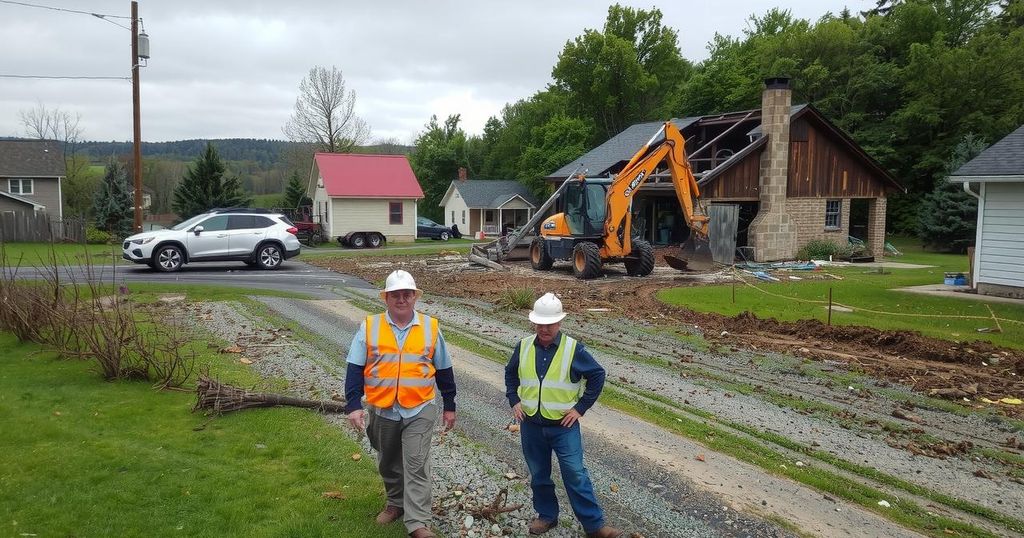World news
AFRICA, BURKINA FASO, DEMOCRAT, EMERGENCY RESPONSE, FEDERAL EMERGENCY MANAGEMENT AGENCY, GOVERNMENT FUNDING, JOSH SHAPIRO, LISA RICE, NATURAL DISASTER, NATURAL DISASTERS, PA, PENNSYLVANIA, SOCIAL SERVICES, SPOTLIGHT PA, STATE COLLEGE, STATE COLLEGE REGIONAL BUREAU, TIOGA, TIOGA COUNTY, UNION COUNTIES
Li Chen
0 Comments
Recovery Efforts Intensify in Rural Pennsylvania Post Tropical Storm Debby
Pennsylvania rural counties are recovering from Tropical Storm Debby, which caused significant flooding and damage in August. Emergency response was overwhelmed with calls, prompting a disaster declaration by the Governor. Federal aid has begun flowing, but local officials seek long-term mitigation strategies to prevent future incidents.
Rural counties in Pennsylvania continue to recover from the impact of Tropical Storm Debby, which recently hit the area, causing significant damage. In August, the unusual intensity of rainfall resulted in more than 500 emergency calls and widespread flooding that washed away roads and damaged numerous properties. While federal aid, including over $12 million in relief from the Federal Emergency Management Agency (FEMA), has offered some assistance, local officials are now seeking long-term strategies to prevent similar devastation in the future.
In Tioga County, emergency dispatch calls surged dramatically due to the storm. Governor Josh Shapiro declared a disaster for 28 counties, highlighting the extensive damage sustained. The majority of financial assistance from FEMA has been directed toward addressing immediate needs, with an average aid amount of approximately $7,969 reported for affected individuals. However, the long-term recovery remains a challenge, prompting officials to address the underlying issues that exacerbate flooding risks in the region.
Local authorities, particularly in Westfield Borough, have noted that flooding is a recurring issue, yet the rapidity and concentration of water during the storm were unprecedented. Lisa Rice, Tioga County’s 911 Director, recounted the harrowing experiences of residents trapped in their homes. “It was like a snap of the finger,” she described, indicating the sudden onslaught of water that ensued.
Residents like Terry VanDusen experienced significant property losses and found federal aid insufficient for comprehensive repairs. Meanwhile, local institutions such as the Westfield Child Development Center also faced considerable challenges due to the flood, with much of the recovery work being shouldered by community volunteers. Despite these hurdles, the day care director expressed her limitations in seeking federal assistance due to guidelines restricting aid to residential properties.
Moreover, the aftermath of the storm has raised concerns regarding debris accumulation in local waterways, specifically in the Cowanesque River, which may lead to future flooding. The Tioga County Board of Commissioners is advocating for state and federal aid to tackle the cleanup, emphasizing the necessity of addressing debris removal to prevent further flooding. Commission member Marc Rice stated, “If it does not get cleaned up, we are in the same boat.”
In conclusion, while the immediate recovery from Tropical Storm Debby has begun, rural Pennsylvania officials are focusing on long-term mitigation strategies to safeguard their communities against future storms. As groups collaborate for solutions, federal resources will be pivotal in rebuilding and enhancing the resilience of affected areas.
The article discusses the aftermath of Tropical Storm Debby in Pennsylvania, illustrating the challenges faced by rural counties during recovery efforts. The storm, which occurred in August, resulted in widespread flooding that caused significant property damage, leading to a surge in emergency calls and necessitating a disaster declaration by the state Governor. The federal government has provided aid, yet ongoing discussions are centered around establishing effective long-term solutions to mitigate future flood risks.
The recovery journey for rural Pennsylvania counties following Tropical Storm Debby emphasizes the ongoing need for effective flood management strategies. While federal aid provides crucial immediate support, local officials are committed to implementing sustainable solutions to safeguard communities against future weather events. The collaboration among state and federal agencies will be essential for enhancing infrastructure and ensuring the safety of residents in these vulnerable areas.
Original Source: www.inquirer.com




Post Comment